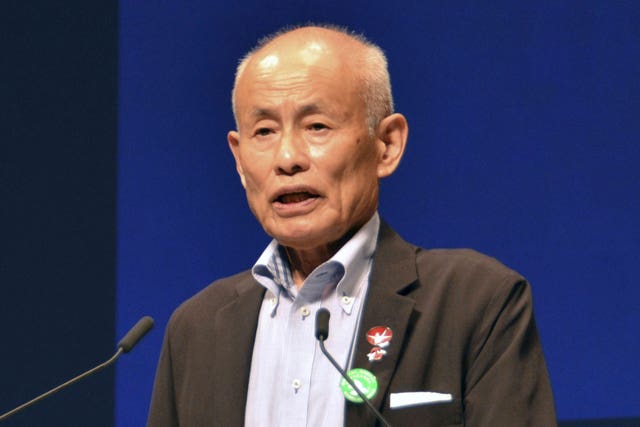The Nobel Peace Prize was awarded on Friday to Nihon Hidankyo, a Japanese organisation of survivors of the US atomic bombings of Hiroshima and Nagasaki, for its activism against nuclear weapons.
Jorgen Watne Frydnes, chair of the Norwegian Nobel Committee, said the award was made as the “taboo against the use of nuclear weapon is under pressure”.
He said the Nobel committee “wishes to honour all survivors who, despite physical suffering and painful memories, have chosen to use their costly experience to cultivate hope and engagement for peace”.
Efforts to eradicate nuclear weapons have been honoured in the past by the Nobel committee.
The International Campaign to Abolish Nuclear Weapons won the Peace Prize in 2017 and in 1995 Joseph Rotblat and the Pugwash Conferences on Science and World Affairs won for “their efforts to diminish the part played by nuclear arms in international politics and, in the longer run, to eliminate such arms”.
This year’s prize was awarded against a backdrop of devastating conflicts raging in the world, notably in the Middle East, Ukraine and Sudan.
Alfred Nobel stated in his will that the prize should be awarded for “the most or the best work for fraternity between nations, for the abolition or reduction of standing armies and for the holding and promotion of peace congresses”.
Last year’s prize went to jailed Iranian activist Narges Mohammadi for her advocacy of women’s rights and democracy, and against the death penalty.

The Nobel committee said it also was a recognition of “the hundreds of thousands of people” who demonstrated against “Iran’s theocratic regime’s policies of discrimination and oppression targeting women”.
In a year of conflict, there had been some speculation before the announcement that the Norwegian Nobel Committee that decides on the winner would opt not to award a prize at all this year.
The Nobel prizes carry a cash award of 11 million Swedish kronor (£770,000).
Unlike the other Nobel prizes that are selected and announced in Stockholm, founder Alfred Nobel decreed the peace prize be decided and awarded in Oslo by the five-member Norwegian Nobel Committee.
The Nobel season ends on Monday with the announcement of the winner of the economics prize, formally known as the Bank of Sweden Prize in Economic Sciences in Memory of Alfred Nobel.




Why are you making commenting on The National only available to subscribers?
We know there are thousands of National readers who want to debate, argue and go back and forth in the comments section of our stories. We’ve got the most informed readers in Scotland, asking each other the big questions about the future of our country.
Unfortunately, though, these important debates are being spoiled by a vocal minority of trolls who aren’t really interested in the issues, try to derail the conversations, register under fake names, and post vile abuse.
So that’s why we’ve decided to make the ability to comment only available to our paying subscribers. That way, all the trolls who post abuse on our website will have to pay if they want to join the debate – and risk a permanent ban from the account that they subscribe with.
The conversation will go back to what it should be about – people who care passionately about the issues, but disagree constructively on what we should do about them. Let’s get that debate started!
Callum Baird, Editor of The National
Comments: Our rules
We want our comments to be a lively and valuable part of our community - a place where readers can debate and engage with the most important local issues. The ability to comment on our stories is a privilege, not a right, however, and that privilege may be withdrawn if it is abused or misused.
Please report any comments that break our rules.
Read the rules here